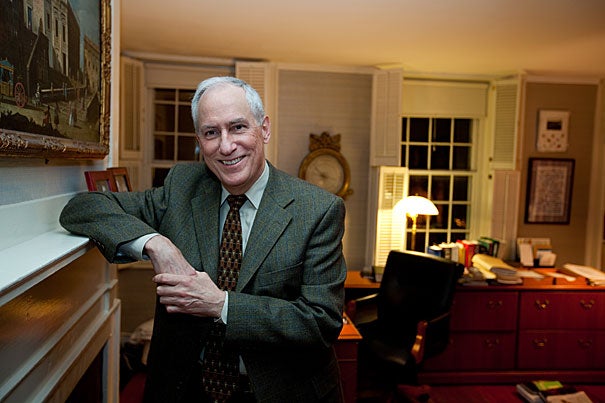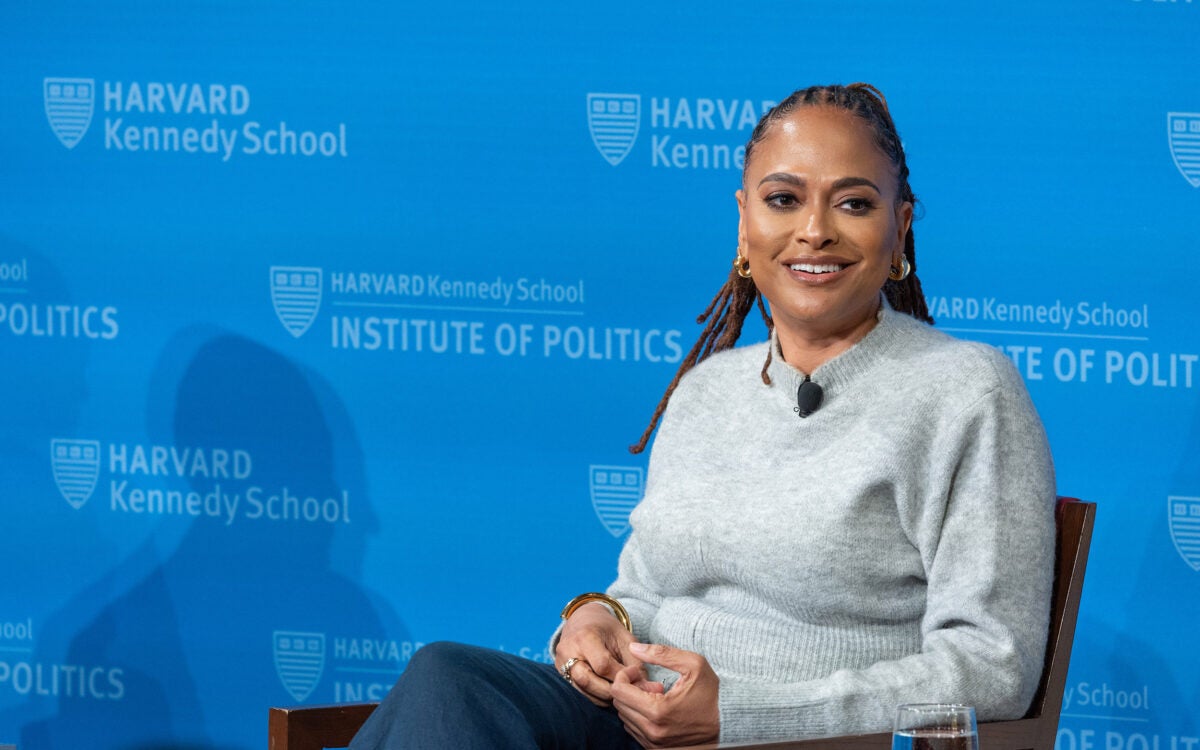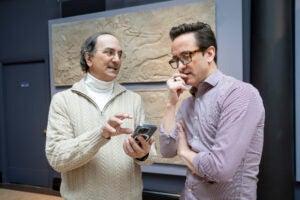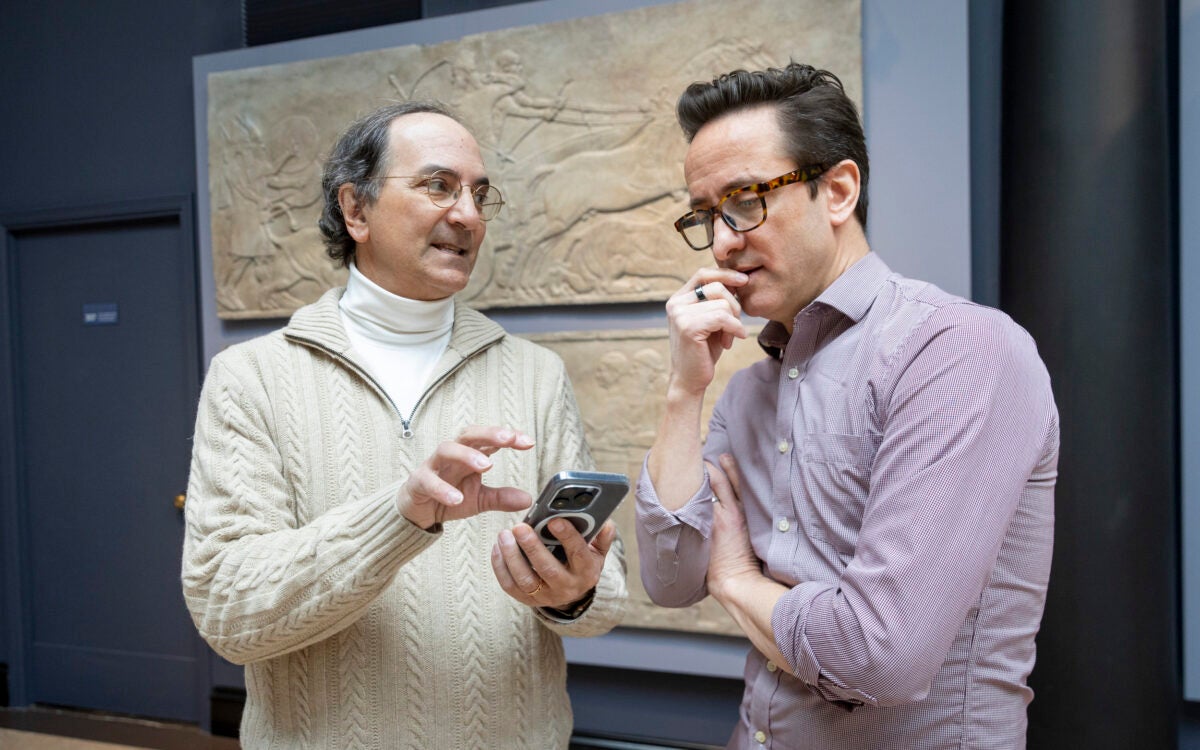
“Old books and e-books do not represent opposites,” said Robert Darnton, a scholar of French history and director of the University Library at Harvard. “They are more complementary than contradictory objects.”
Rose Lincoln/Harvard Staff Photographer
The whither and why of books
Conference examines the place of venerable, vulnerable print in a rapidly evolving digital future
Here’s a tweet summing up a recent Harvard conference: “Will the Internet age kill the printed book? LOL.”
Sponsored by the Radcliffe Institute for Advanced Study, the “Why Books?” conference drew more than 500 attendees on Oct. 29. By late morning, hundreds of their posts had lit up the Twitter airwaves.
Conference scholars seemed to reach consensus that traditional books will survive and merge with digital technologies to meet a common goal: to store, retrieve, and circulate words and images.
“Old books and e-books do not represent opposites,” said Robert Darnton, a scholar of French history and director of the University Library at Harvard. “They are more complementary than contradictory objects.”
The speakers also suggested that books will endure by providing qualities a computer screen cannot. They can be owned and shared, and they have a material amplitude that invites sensory experience. Elizabeth Long, a Rice University sociologist who studies reading, praised books for their comforting heft and for the sentimental value that can make them “a bridge to that prior self.”
“Why Books?” was the culmination of two years of planning by a faculty committee co-chaired by literary scholar Leah Price ’91 and historian Ann Blair ’84, both Harvard College professors.
“We use books every day,” said Price, but often take them for granted or even forget them. She told the story of a 19th century British librarian who cataloged every book in the Bodleian Library except one. He had been sitting on it for 36 years.
The fate of the cozy technology, part of the Western world for five centuries, engenders some anxiety. Both books and readers are moving fast into a digital world “whose shape we do not know,” said Darnton, Harvard’s Carl H. Pforzheimer University Professor and author of “The Case for Books: Past, Present, and Future” (PublicAffairs, 2009).
He grew up in an age when scholars sat in library archives armed with pencils and index cards, which would be “embarrassing” now, said Darnton, when younger researchers bring laptops and digital cameras for rapid information storage.
But his next book, on politicized Parisian popular songs of the 18th century, will include a CD of music that recaptures sound, “a dimension of the past that is largely missing,” said Darnton. “The new electronic media and the old forms of research belong together.”
Harvard computer scientist Stuart Shieber said electronic devices like the Kindle reader are unlikely to eliminate books. For one, e-readers remain inferior to the codex in contrast, color, and resolution. (A modern book is a “codex,” an information-storage device whose sequential but searchable pages are bound between covers.)
But Shieber said book and e-book technologies will be nearly equal in readability and navigation soon. By then, readers will favor the slim, portable e-readers, but will still purchase books, which can be shared and owned. “You can’t buy an e-book,” he said. “You can only rent it.”
John Palfrey, Harvard Law School’s Henry N. Ess III Librarian and Professor of Law and vice dean of Library and Information Services, said the “vibrant space” of Twitter traffic at the conference illustrated the present “hybrid moment” that combines books and the Internet.
But hundreds of Twitter feeds from a single conference also illustrate the challenge that future scholars face: the sheer volume of what social media creates, to say nothing of the intricate layers of information stored within, say, one author’s computer.
“Spiraling nebulae” of information mean that today’s writers “will not and cannot be studied” as writers of the past have been, said University of Maryland English professor Matthew G. Kirschenbaum. Curatorial practices of the future, he said, will rely on computer forensics as much as traditional scholarly acumen.
Meanwhile, “you can’t save everything,” said Kirschenbaum, even in an age when libraries at Harvard and elsewhere are busily harvesting data from the Web, including the blogs and tweets of modern discourse.
But it’s vital that libraries save more than ever, said University of Pennsylvania humanities professor Peter Stallybrass, especially the unbound ephemera that libraries were not designed to store.
Isabel Hofmeyr, a literature professor at the University of Witwaterstrand in South Africa, offered an example of what traditional libraries have missed: “Indian Home Rule,” a 1910 booklet by Mohandas K. Gandhi. This “key archive of Gandhian thought,” she said, has been collected in none of the world’s great libraries.
“Print outside the book” is equally important to understanding early African-American poets, said Rutgers University English professor Meredith L. McGill. Digital archiving may help to rescue their work, now languishing in chapbooks and newspapers.
In the emerging digital age, libraries as well as books are at a critical juncture, said Palfrey, who is also faculty co-director of Harvard’s Berkman Center for Internet & Society. “I see a brighter future for libraries, but there is anxiety.”
Part of that anxiety comes from modern attempts at creating a “universal library,” said University of Chicago historian Adrian Johns. Google Book Search and other systems, he said, are more interested in mining data from books than in the books themselves.
But the engineers extracting this mass of information from the print world often don’t understand books very well, said Paul Duguid, an information historian at the University of California, Berkeley. They skip texts when digitizing multiple-volume books; copy the worst editions; and even see books as “the final impediment to getting information,” he said.
These engineers of the digital realm need to wake up and smell the printer’s ink, said Duguid. “Material matters, and we forget that.”
For all the Twitter traffic from “Why Books?”.




